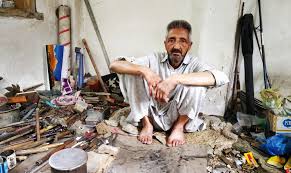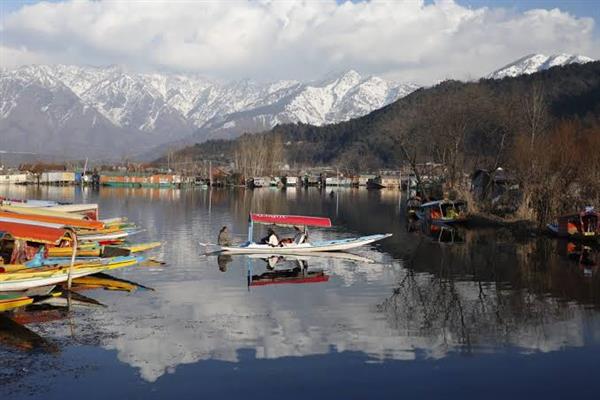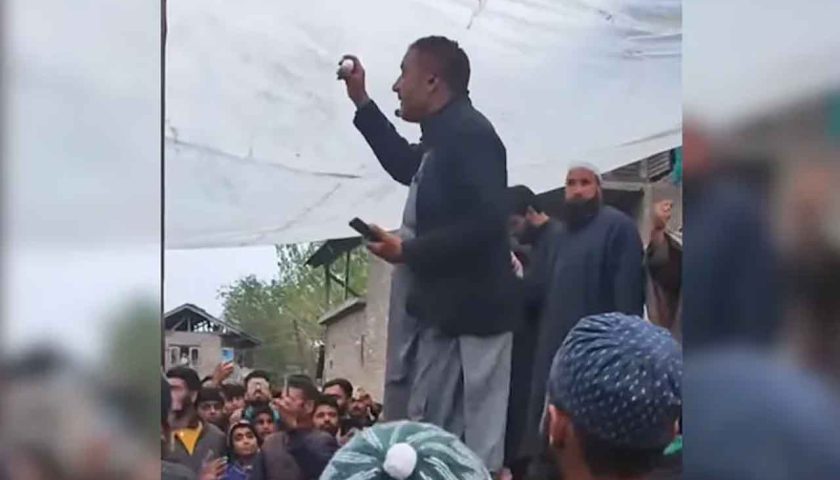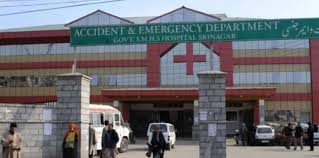The art of repairing all kinds of machines and other items has been handed down generations and over time, the craftsmen came known as ‘German Khars’ for their ability to repair German-made machines – a rare skill in the Valley.
A narrow lane in Banduk Khar locality of Rainawari area of Srinagar leads to a dead end where a few houses dating back to over a hundred years stand out. Their intricately designed lattice widows and small bricks from the era of Maharaja Hari Singh distinguish them from the concrete structures around them.
In a small, single room built on the edge of the garden close to his old house, Ghulam Mohiuddin Ahanger, 70, sits stooped on a worn out rug, with some faulty blood pressure machines, different surgical equipments, and other machine parts and his tools. He is working on repairing them, a skill that he is well known for.
Ghulam is one of only two old men left in the neighborhood and perhaps in the Valley, and are known as “German Khars” for their special skills and ability to mend hospital equipment and other machines made of iron and steel. His older cousin, Abdul Rehman Ahanger who works in another small room in a nearby house, is the other surviving German Khar. Even in their old age, they spend hours every day in their small workshops.
It’s a skill generationally handed down from their fathers who picked it up from their own elders. They even make their own tools. Their reputation brings clients from all over the valley who bring broken hospital equipment – wheel chairs, blood pressure machines, hospital beds – who know that only the Khars can get them running again. Equipment from the pre-electronic era is not always easy to fix. The whole process could take days, even weeks – getting spare parts is not easy and occasionally the Khars will make those too.
They say they have never received government support. “Governments could have provided us some space and we could have taught younger people in workshops where we could pass on our knowledge and also learn new things,” says Ahanger, who is still eager to find some young apprentices. “But nothing was done over the years and we were neglected.”
“They never went to ministers or begged officials for help. They are dignified craftsmen who work hard and do their work honestly. Whatever little they earn now from this work, they are happy with it, ” says Ghulam Ahanger’s son Bilal Ahmad.
Ahmad says he can’t stop his father from working in his old age even when he wants him to retire now. “He always thinks about his work and his workshop and he’s happy working there for the whole day,” he says. “Sometime back he couldn’t work for a week in his workshop. He fell sick because he couldn’t live without doing anything. He’s very much attached to his work even though he earns little from it now.”
A short walking distance from the workshop, in the garden of a 200-year-old house in another small room, 75-year-old Abdul Rehman Ahanger is sitting alone, busy repairing machine equipments with his little tools. He says he learnt the craft in his youth by observing his father and elders who kept themselves busy in similar workshops close to their homes. Since his early 20s, he’s been at it, repairing and making exact replicas of machine parts and fixing other equipment in his workshop.
The most complicated thing Ghulam Moiudin Ahanger made was a steel cap which was required to be fitted in the jaw of a teenager who was badly injured in his face after a bear attacked him in southern Kashmir about seven years ago. After the emergency request came in from the doctors treating the boy in Srinagar’s tertiary care hospital SKIMS, Ahanger worked in his workshop for a full night, making a steel cap as per the required measurements sent by the hospital surgeons. Unfortunately, before the cap could read the hospital, the boy had succumbed to his injuries. Ahanger didn’t charge anything from the hospital for this work.
The origins of their name is interesting – Abdul Rehman says some equipment, originally made in Germany, was once brought to their elders by a German national in Srinagar who had failed to get its repaired elsewhere in the valley in early 1940s. “He had struggled to get it repaired anywhere in the valley and then he came to us,” he says. “My father worked on it for days and fixed it for him. The German national was happy. Since then the name stuck and our fathers and elders came to be known as German Khars.”
Mohiudin Ahanger shows an old, handwritten letter of appreciation given to his father by a foreign national who was working as an administrator in a city hospital in the early 1940s. Written on an official letterhead titled “His Highness Government, Jammu and Kashmir”, dated March 27, 1940, the letter was drafted by a foreigner named S (his second name is illegible). “Subhana mistri of Rainawari has done instruments and hospital requisites for the DG Hospital for the last four years. His work is extremely thorough and precise. His imitation from other instruments is so prefect that one cannot tell which is real work and which is the imitation” “For a small station like Srinagar to find a man of his precision and intelligence is an acquisition.”
The Ahangers say they used to be very busy and get plenty of work in the years prior to the 2008 Amarnath land row agitation. The subsequent years brought less work. Earlier, Rehman Ahanger had the company of his elder brother, Habibullah Ahanger, another skilled and experienced blacksmith who specialised in repairing varieties of fishing rods, including ones brought by foreigners. They would work together in the room every day before Habibullah’s died at the age of 80 in 2015. He worked in the workshop till his last days.
Being alone now and getting older, Ahanger does his work slowly these days, sometimes taking weeks to repair instruments people have left at his workshop. “The raw material is also very expensive now,” he rues. “And people get their things repaired from machines and engineers. Why would people bother to find old men like us and give us work?” he smiles ruefully.
He still works a full day, between 9 am and 7 pm. Over the decades, he has come to specialise in making nameplates and repairing fishing rods. These days he’s carving out golden coloured metallic alphabets, carefully attaching them one by one on to the black coloured nameplate. A senior doctor needs it for his office.
Given the strenuous labour involved and diminishing returns, their children have always been less inclined to take up this work as a source of their livelihood. They made a living from other businesses, while some have taken up government jobs. “They know not enough can be earned from this work now which is true,” says Rehman Ahanger. “Earlier we would earn about Rs 1,000 per day as we would get enough work from people. Now we are barely able to earn 300 rupees on a good day.”
“Who will do this work after us?” wonders Ghulam Mohiuddin. “Today the young people don’t have patience to sit and learn this craft like we did in our youth.The skill could die out after we have gone.”
Majid Maqbool






